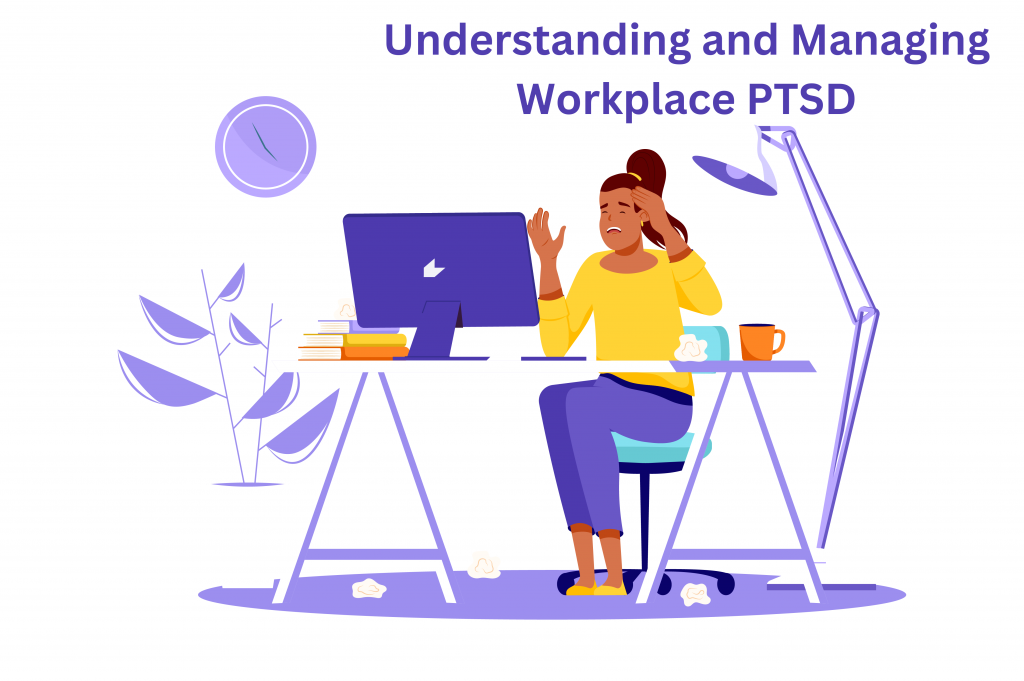Workplace PTSD is a growing concern that affects both employees and employers. In order to effectively address and manage this issue, it is crucial to have a clear understanding of what PTSD is, its causes, and the symptoms associated with it.
Understanding PTSD
PTSD, or Post-Traumatic Stress Disorder, is a mental health condition that can occur after someone has experienced or witnessed a traumatic event. It is not limited to combat veterans or first responders and can affect individuals from various backgrounds.
What is PTSD?
PTSD is a disorder that can develop after a person experiences or witnesses a traumatic event. This can include events such as physical or sexual assault, accidents, natural disasters, or military combat. Those with PTSD may experience intrusive thoughts, nightmares, flashbacks, and increased anxiety.
Causes of PTSD
While the exact cause of PTSD is not fully understood, it is believed to be a combination of genetic, biological, and environmental factors. Traumatic experiences, especially those that are life-threatening or cause intense fear, can trigger the development of PTSD. Additionally, individuals with a history of mental health issues may be more susceptible to PTSD.
Research has shown that certain risk factors can increase the likelihood of developing PTSD. These risk factors include a history of trauma or abuse, a family history of mental health disorders, a lack of social support, and certain personality traits such as impulsivity or negative thinking patterns.
Furthermore, the brain’s response to trauma plays a significant role in the development of PTSD. When a person experiences a traumatic event, the amygdala, which is responsible for processing emotions, goes into overdrive. This leads to an increased release of stress hormones, such as adrenaline and cortisol, which can disrupt normal brain functioning and contribute to the development of PTSD.
Symptoms of PTSD
The symptoms of PTSD can vary from person to person. Common symptoms include re-experiencing the traumatic event, avoidance of reminders or triggers, negative changes in thinking and mood, and increased arousal or hyperarousal. It is important to note that PTSD symptoms can significantly impact an individual’s daily life and overall well-being.
Re-experiencing symptoms can manifest as intrusive thoughts, flashbacks, or nightmares related to the traumatic event. These intrusive memories can be triggered by certain sights, sounds, or smells that remind the person of the trauma. Avoidance symptoms, on the other hand, involve avoiding people, places, or activities that might trigger memories of the traumatic event. This avoidance can lead to social isolation and a loss of interest in previously enjoyed activities.
Negative changes in thinking and mood can include negative thoughts about oneself or the world, feelings of guilt or shame, and diminished interest in activities or relationships. Individuals with PTSD may also experience difficulties in concentrating, memory problems, and a distorted sense of blame for the traumatic event.
Increased arousal or hyperarousal symptoms can manifest as irritability, anger outbursts, difficulty sleeping, hypervigilance, and an exaggerated startle response. These symptoms can make it challenging for individuals with PTSD to relax or feel safe, leading to a constant state of heightened alertness.
It is important to note that not everyone who experiences a traumatic event will develop PTSD. The severity and duration of the trauma, as well as an individual’s personal resilience and coping skills, can influence the likelihood of developing the disorder.
PTSD in the Workplace
Workplace PTSD is a specific category of PTSD that occurs as a result of traumatic experiences or events that happen in the workplace. It can affect individuals in various professions and industries.
Prevalence of Workplace PTSD
The prevalence of workplace PTSD is alarming. Many employees experience traumatic events such as workplace accidents, acts of violence, or harassment. According to research, up to 20% of individuals who experience a traumatic workplace event may develop symptoms of PTSD.
Causes of Workplace PTSD
Workplace PTSD can be caused by a wide range of traumatic events, including but not limited to accidents, physical assault, verbal abuse, sexual harassment, or witnessing a traumatic event. Factors such as a high-stress work environment, lack of support, or organizational culture can also contribute to the development of workplace PTSD.
Impact of PTSD on Work Performance
PTSD can have a significant impact on an individual’s work performance. Symptoms such as intrusive thoughts, difficulty concentrating, and hyperarousal can affect the ability to focus, make decisions, and maintain productivity. Additionally, individuals with PTSD may experience absenteeism and presentism, leading to decreased overall work performance.
Recognizing PTSD in Employees
Recognizing signs of PTSD in employees is crucial for early intervention and support. Managers and colleagues should be aware of the common signs and symptoms of PTSD in order to provide appropriate assistance.
Signs and Symptoms to Look Out For
Some common signs and symptoms of PTSD in the workplace include emotional distress, changes in behavior, increased irritability or anger, difficulty sleeping, and avoidance of certain situations or triggers. It is important to remember that everyone may manifest symptoms differently, so it is essential to approach each situation with empathy and understanding.
The Role of Managers and Colleagues in Identification
Managers and colleagues play a vital role in identifying employees who may be experiencing PTSD. Creating a supportive and non-judgmental environment is key to encouraging open communication. Managers should be trained to recognize the signs of PTSD and provide resources for help and support.
Managing Workplace PTSD
Managing workplace PTSD requires a comprehensive approach that includes implementing workplace policies, establishing support systems, and providing reasonable accommodations for employees with PTSD.

Workplace Policies for PTSD
Employers should consider implementing workplace policies that address PTSD and provide guidelines for prevention and support. These policies should emphasize creating a safe and supportive work environment and ensuring that employees feel comfortable disclosing their condition and seeking help without fear of stigma or discrimination.
Support Systems in the Workplace
A robust support system is crucial for employees with PTSD. This can include access to mental health services, employee assistance programs, and regular check-ins by managers to ensure their well-being. Support groups or peer networks can also provide a sense of community and understanding for those dealing with workplace PTSD.
Reasonable Accommodations for Employees with PTSD
Employers should work closely with employees with PTSD to identify reasonable accommodations that can help them manage their condition in the workplace. This may include flexible work hours, modified workload, quiet spaces, or providing the option to work remotely. Accommodations should be tailored to each individual’s needs and may require ongoing communication and adjustment.
In conclusion, understanding and managing workplace PTSD is essential for the well-being of employees and the overall productivity of the organization. By creating a supportive work environment, recognizing the signs of PTSD, and implementing appropriate policies and accommodations, employers can help employees with PTSD navigate their workplace and thrive in their roles.
Treating Workplace PTSD

We believe in mental health services issues with compassion, understanding, and a thorough approach to encourage healing and recovery. As a nationally acclaimed treatment center located in Hollywood, Florida, at Compassion Behavioral Health, we provide comprehensive, evidence-based dual-diagnosis treatment for patients struggling with substance use disorder and concurrent mental health problems. Contact us today at (844) 612-0444 for assistance.




